人教版八年级上册Unit 8 How do you make a banana milk shake 第四课时习题课件(共35张PPT)
文档属性
| 名称 | 人教版八年级上册Unit 8 How do you make a banana milk shake 第四课时习题课件(共35张PPT) |
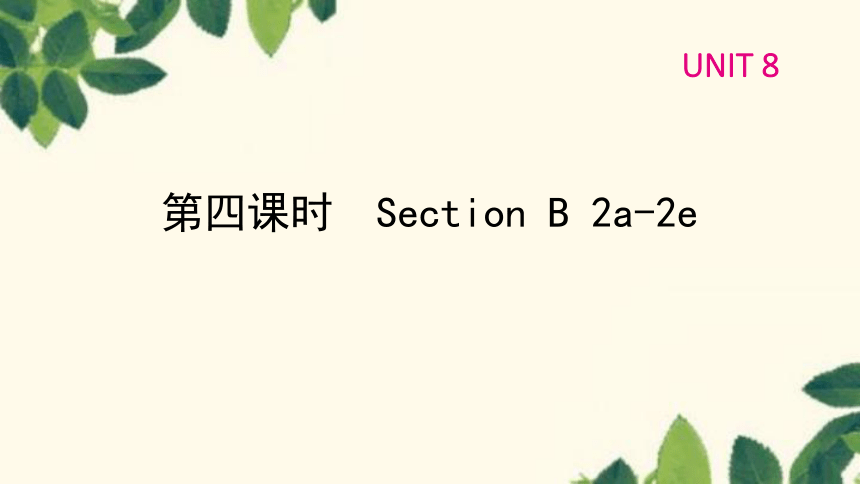
|
|
| 格式 | pptx | ||
| 文件大小 | 452.5KB | ||
| 资源类型 | 教案 | ||
| 版本资源 | 人教新目标(Go for it)版 | ||
| 科目 | 英语 | ||
| 更新时间 | 2023-07-19 00:00:00 | ||
图片预览

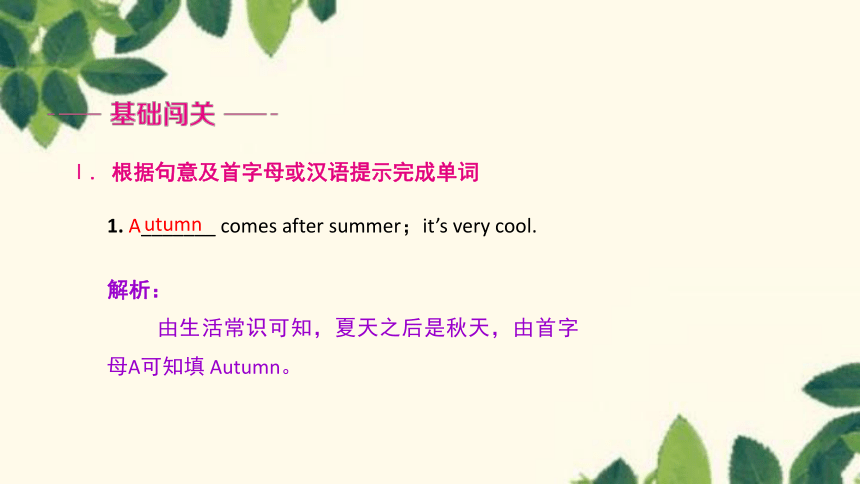
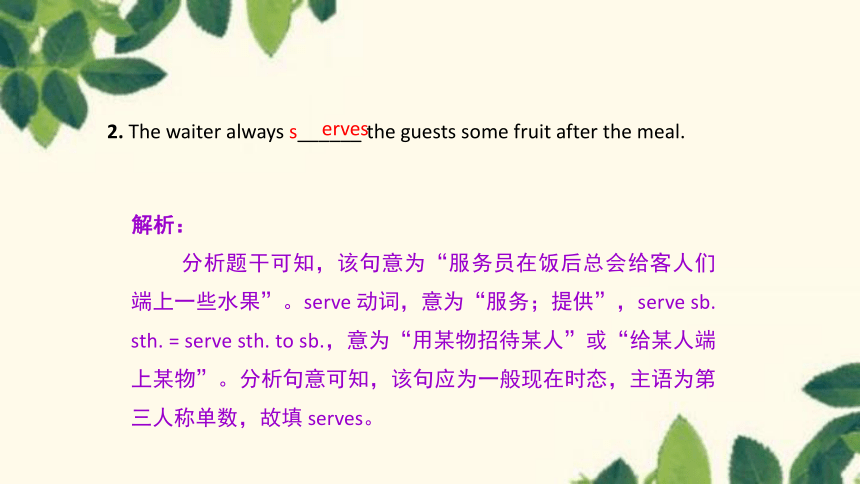
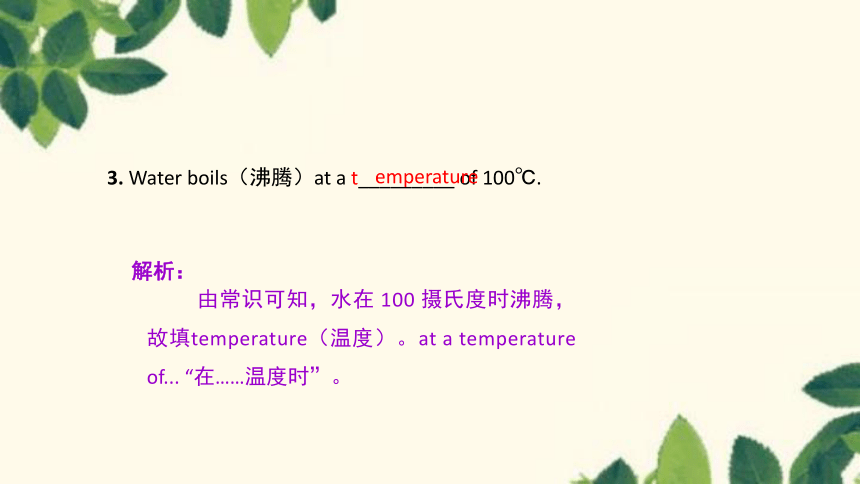
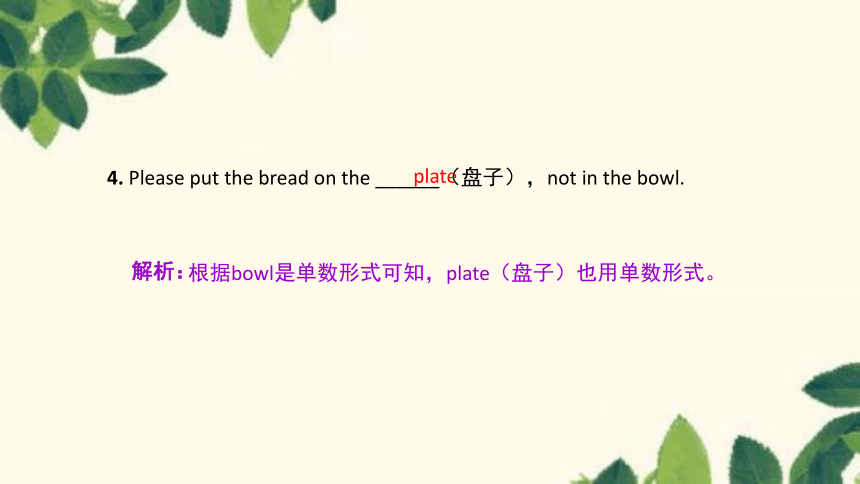
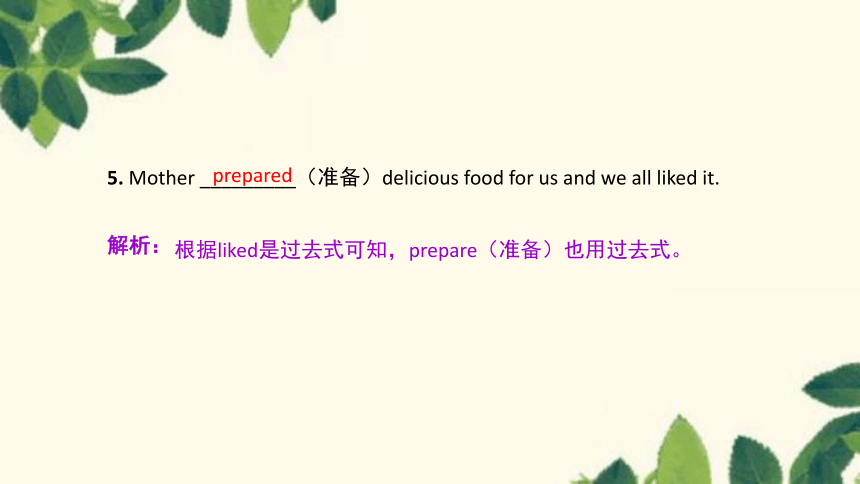
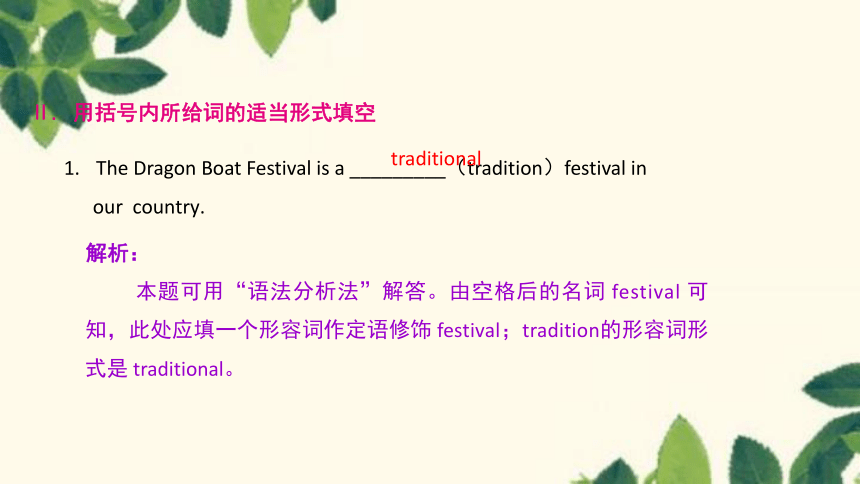
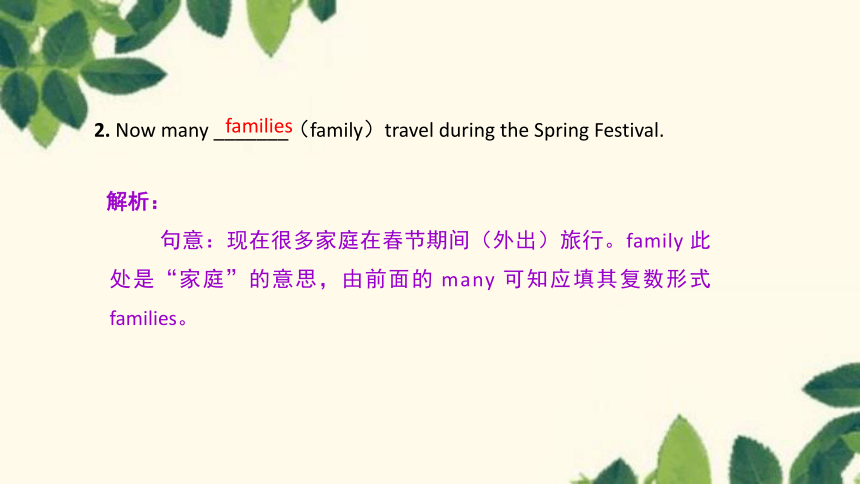
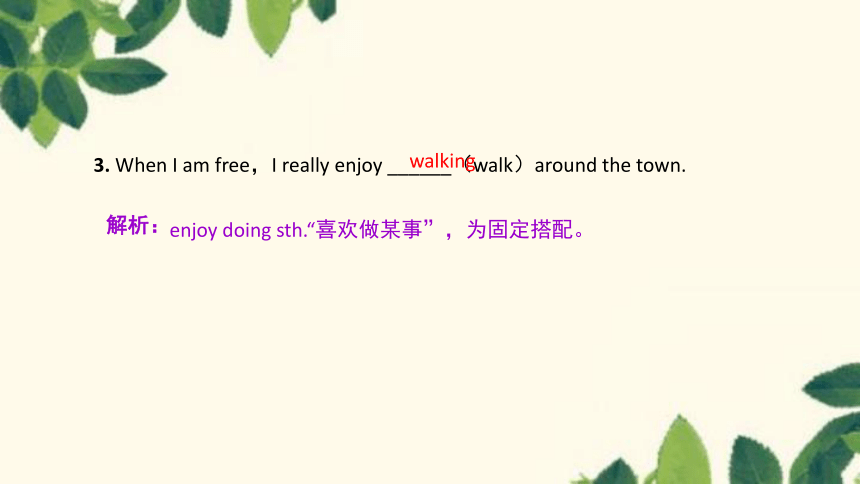
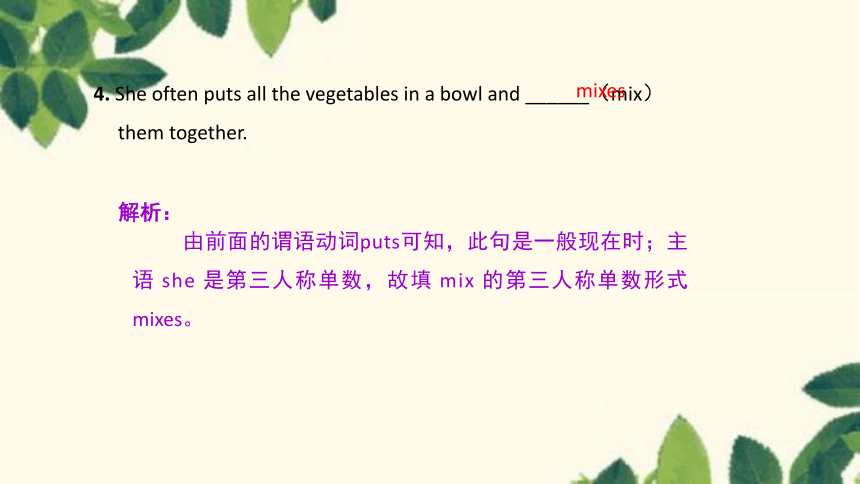
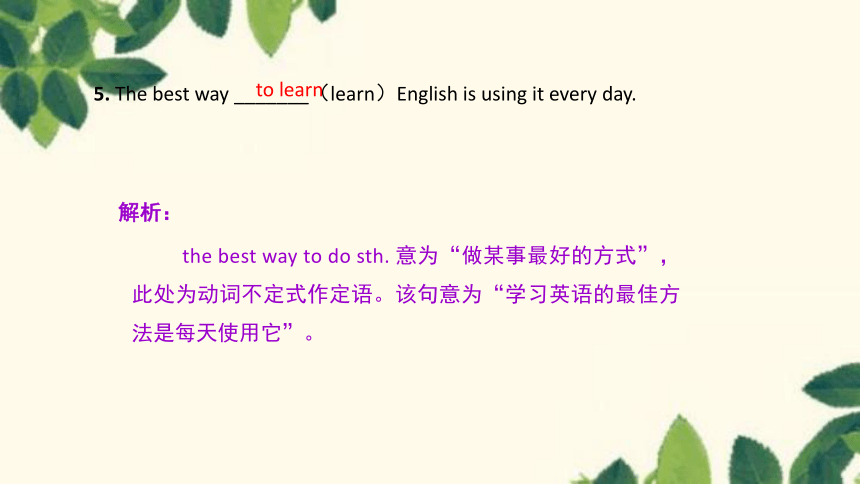
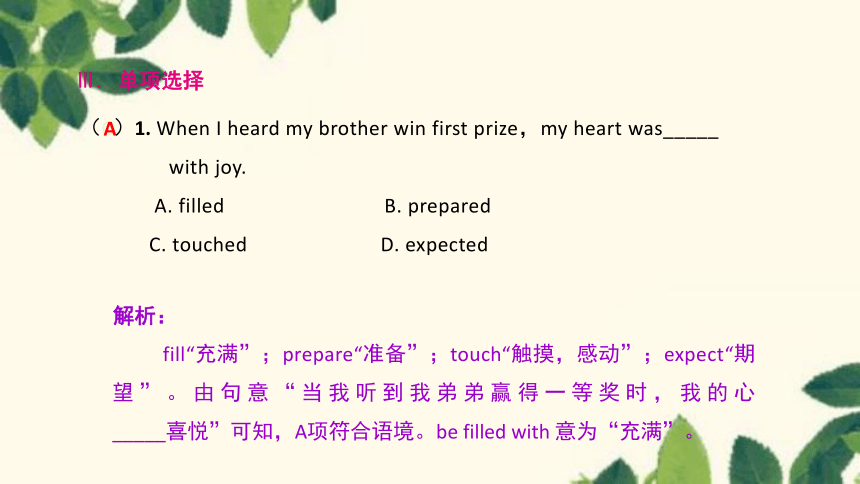
文档简介
(共35张PPT)
第四课时 Section B 2a-2e
UNIT 8
Ⅰ. 根据句意及首字母或汉语提示完成单词
1. A_______ comes after summer;it’s very cool.
utumn
由生活常识可知,夏天之后是秋天,由首字母A可知填 Autumn。
解析:
2. The waiter always s______ the guests some fruit after the meal.
erves
分析题干可知,该句意为“服务员在饭后总会给客人们端上一些水果”。serve 动词,意为“服务;提供”,serve sb. sth. = serve sth. to sb.,意为“用某物招待某人”或“给某人端上某物”。分析句意可知,该句应为一般现在时态,主语为第三人称单数,故填 serves。
解析:
3. Water boils(沸腾)at a t_________ of 100℃.
emperature
由常识可知,水在 100 摄氏度时沸腾,故填temperature(温度)。at a temperature of... “在……温度时”。
解析:
4. Please put the bread on the ______(盘子),not in the bowl.
plate
根据bowl是单数形式可知,plate(盘子)也用单数形式。
解析:
5. Mother _________(准备)delicious food for us and we all liked it.
prepared
根据liked是过去式可知,prepare(准备)也用过去式。
解析:
Ⅱ. 用括号内所给词的适当形式填空
The Dragon Boat Festival is a _________(tradition)festival in
our country.
traditional
本题可用“语法分析法”解答。由空格后的名词 festival 可知,此处应填一个形容词作定语修饰 festival;tradition的形容词形式是 traditional。
解析:
2. Now many _______(family)travel during the Spring Festival.
families
句意:现在很多家庭在春节期间(外出)旅行。family 此处是“家庭”的意思,由前面的 many 可知应填其复数形式 families。
解析:
3. When I am free,I really enjoy ______(walk)around the town.
walking
enjoy doing sth.“喜欢做某事”,为固定搭配。
解析:
4. She often puts all the vegetables in a bowl and ______(mix)
them together.
mixes
由前面的谓语动词puts可知,此句是一般现在时;主语 she 是第三人称单数,故填 mix 的第三人称单数形式 mixes。
解析:
5. The best way _______(learn)English is using it every day.
to learn
the best way to do sth. 意为“做某事最好的方式”,此处为动词不定式作定语。该句意为“学习英语的最佳方法是每天使用它”。
解析:
(C)1. When I heard my brother win first prize,my heart was_____ with joy.
A. filled B. prepared
C. touched D. expected
Ⅲ. 单项选择
A
fill“充满”;prepare“准备”;touch“触摸,感动”;expect“期望”。由句意“当我听到我弟弟赢得一等奖时,我的心 _____喜悦”可知,A项符合语境。be filled with 意为“充满”。
解析:
(A)2. Please cover the computer _____ a cloth,or it will get dirty easily.
A. of B. with
C. on D. under
B
cover...with...“用……盖上……”,是固定搭配,故选 B。句意:请用一块布把电脑盖上,否则它会容易变脏。
解析:
(C)3. —Look,how wonderful this paper cutting is!
—So it is. Paper cutting is a _____Chinese art with a long history.
A. common B. modern
C. simple D. traditional
D
句意:“瞧,这张剪纸是多么棒啊!”“它的确不错。剪纸是一门 中国艺术,有着悠久的历史。”common“普通的”;modern“现代的”;simple“简单的”;traditional“传统的”。根据with a long history可判断,这里表示剪纸是“传统的”中国艺术。故选 D。
解析:
(B)4. Add some honey and ______ the ingredients(配料).
A. cut up B. mix up
C. turn on D. put on
B
cut up“切碎”;mix up“混合”;turn on“打开”;put on“穿上”。由句意“添加一些蜂蜜,把配料 ______”可知,B项最符合题意。
解析:
Ⅳ. 英汉互译
1. 饺子是我们的传统食物。
_________________________________________________
2. 你需要去测量一下体温。
_________________________________________________
3. 父亲节在六月份的第三个星期日。
_________________________________________________
4. We should give thanks for what we have now.
_________________________________________________
5. Cut the bread into thin pieces.
_________________________________________________
6. It’s time to have lunch.
_________________________________________________
Dumplings are our traditional food.
You need to take your temperature.
Father’s Day is on the third Sunday in June.
我们应该感谢我们现在所拥有的。
把面包切成薄片。
到吃午餐的时间了。
Ⅰ. 阅读理解
话题:饮食习惯 难度:★★★ 建议用时:5′
根据短文内容,从方框内所给的选项中选出能填入空白处的最佳选项,使短文意思通顺。(有一项为多余项)
(20-21 临沂莒南期末)People eat different things in different parts of the world. In south China we eat rice every day. Sometimes we eat it two or three times a day,for breakfast,lunch and supper.
1
The Japanese eat rice,too. 2 They sometimes eat raw(生的)fish. In Africa,corn is the most important food. People there make corn into flour(面粉). From this flour they make different kinds of bread and cakes.
In western(西方的)countries such as Britain,Australia and the USA,the most important food is bread or potatoes. 3 They cook the potatoes in different ways. In England,the most popular food is fish and chips. Sometimes people cook this food at home,but usually they buy it at the shop. 4 People call it“take-away”food.
People there usually make their
bread from wheat flour.
B. We usually eat it with fish,meat
and vegetables.
C. They eat this food at home,in
their work place,in the park or on
the road.
D. There are many kinds of fish in the
world.
E. They also eat a lot of fish.
1._______
B
由上文“我们有时一天吃米饭两次或三次,在早餐、午餐、晚餐时吃”可知,B项“我们通常和鱼、肉、蔬菜一起吃它”符合语境。
解析:
People there usually make their
bread from wheat flour.
B. We usually eat it with fish,meat
and vegetables.
C. They eat this food at home,in
their work place,in the park or on
the road.
D. There are many kinds of fish in the
world.
E. They also eat a lot of fish.
2._______
E
由下文“他们有时候吃生鱼片”可知,此处应与“鱼”有关,故E项“他们也吃很多鱼”符合语境。
解析:
(20-21 临沂莒南期末)People eat different things in different parts of the world. In south China we eat rice every day. Sometimes we eat it two or three times a day,for breakfast,lunch and supper.
1
The Japanese eat rice,too. 2 They sometimes eat raw(生的)fish. In Africa,corn is the most important food. People there make corn into flour(面粉). From this flour they make different kinds of bread and cakes.
In western(西方的)countries such as Britain,Australia and the USA,the most important food is bread or potatoes. 3 They cook the potatoes in different ways. In England,the most popular food is fish and chips. Sometimes people cook this food at home,but usually they buy it at the shop. 4 People call it“take-away”food.
People there usually make their
bread from wheat flour.
B. We usually eat it with fish,meat
and vegetables.
C. They eat this food at home,in
their work place,in the park or on
the road.
D. There are many kinds of fish in the
world.
E. They also eat a lot of fish.
3._______
A
由上文“在西方国家比如……最重要的食物是面包或土豆”以及下文“他们用不同的方法烹饪土豆”可知,此处谈论的是烹饪方法,故A项“那里的人们通常用小麦粉做面包”符合语境。
解析:
(20-21 临沂莒南期末)People eat different things in different parts of the world. In south China we eat rice every day. Sometimes we eat it two or three times a day,for breakfast,lunch and supper.
1
The Japanese eat rice,too. 2 They sometimes eat raw(生的)fish. In Africa,corn is the most important food. People there make corn into flour(面粉). From this flour they make different kinds of bread and cakes.
In western(西方的)countries such as Britain,Australia and the USA,the most important food is bread or potatoes. 3 They cook the potatoes in different ways. In England,the most popular food is fish and chips. Sometimes people cook this food at home,but usually they buy it at the shop. 4 People call it“take-away”food.
People there usually make their
bread from wheat flour.
B. We usually eat it with fish,meat
and vegetables.
C. They eat this food at home,in
their work place,in the park or on
the road.
D. There are many kinds of fish in the
world.
E. They also eat a lot of fish.
4._______
C
由上文“有时人们在家做这种食物,但是他们通常在商店买它”以及下文“人们称它为‘可外带的’食物”可知,C项符合语境。
解析:
(20-21 临沂莒南期末)People eat different things in different parts of the world. In south China we eat rice every day. Sometimes we eat it two or three times a day,for breakfast,lunch and supper.
1
The Japanese eat rice,too. 2 They sometimes eat raw(生的)fish. In Africa,corn is the most important food. People there make corn into flour(面粉). From this flour they make different kinds of bread and cakes.
In western(西方的)countries such as Britain,Australia and the USA,the most important food is bread or potatoes. 3 They cook the potatoes in different ways. In England,the most popular food is fish and chips. Sometimes people cook this food at home,but usually they buy it at the shop. 4 People call it“take-away”food.
Ⅱ. 完形填空
话题:煎鸡蛋 难度:★★★ 建议用时:8′
(20-21 枣庄期末)When I was young,I enjoyed watching my mother cook. My favorite food was fried eggs(煎鸡蛋),so my mother often cooked them 1 me. Every time she cooked fried eggs,I couldn’t 2 to eat.
One day,my mother was not at home. I decided 3 an egg by 4 . Having watched my mother do it many times before,I thought I would 5 it. 6 ,I washed the pan(平底锅). Next,I 7 some oil into the pan. Then,I 8 the stove.
However,when it became hot,the oil splattered(飞溅)all over the stove. Some of it got on my face and arms. I was so scared 9 I cried out and did not even try to go near the pan! After 10 minutes,the oil 11 splattering. I turned off the stove quickly and spent the next hour 12 the 13 .
After that,I didn’t give up. I kept on learning 14 from my mother. 15 I made it!
( )1. A. for B. to
C. of D. on
A
由上文“我最喜欢的食物是煎鸡蛋”可知,此处表示“所以我妈妈经常做给我”。故选for(给,对,供)。
解析:
( )2. A. plan B. hope
C. wait D. try
C
can’t wait to do sth.“迫不及待做某事”,是固定搭配。
解析:
(20-21 枣庄期末)When I was young,I enjoyed watching my mother cook. My favorite food was fried eggs(煎鸡蛋),so my mother often cooked them 1 me. Every time she cooked fried eggs,I couldn’t 2 to eat.
One day,my mother was not at home. I decided 3 an egg by 4 . Having watched my mother do it many times before,I thought I would 5 it. 6 ,I washed the pan(平底锅). Next,I 7 some oil into the pan. Then,I 8 the stove.
However,when it became hot,the oil splattered(飞溅)all over the stove. Some of it got on my face and arms. I was so scared 9 I cried out and did not even try to go near the pan! After 10 minutes,the oil 11 splattering. I turned off the stove quickly and spent the next hour 12 the 13 .
After that,I didn’t give up. I kept on learning 14 from my mother. 15 I made it!
( )3. A. fry B. to fry
C. frying D. fried
B
decide to do sth.“决定做某事”,是固定搭配。
解析:
(20-21 枣庄期末)When I was young,I enjoyed watching my mother cook. My favorite food was fried eggs(煎鸡蛋),so my mother often cooked them 1 me. Every time she cooked fried eggs,I couldn’t 2 to eat.
One day,my mother was not at home. I decided 3 an egg by 4 . Having watched my mother do it many times before,I thought I would 5 it. 6 ,I washed the pan(平底锅). Next,I 7 some oil into the pan. Then,I 8 the stove.
However,when it became hot,the oil splattered(飞溅)all over the stove. Some of it got on my face and arms. I was so scared 9 I cried out and did not even try to go near the pan! After 10 minutes,the oil 11 splattering. I turned off the stove quickly and spent the next hour 12 the 13 .
After that,I didn’t give up. I kept on learning 14 from my mother. 15 I made it!
( )4. A. me B. myself
C. my D. mine
B
by oneself 意为“独自,单独”,故选B。
解析:
(20-21 枣庄期末)When I was young,I enjoyed watching my mother cook. My favorite food was fried eggs(煎鸡蛋),so my mother often cooked them 1 me. Every time she cooked fried eggs,I couldn’t 2 to eat.
One day,my mother was not at home. I decided 3 an egg by 4 . Having watched my mother do it many times before,I thought I would 5 it. 6 ,I washed the pan(平底锅). Next,I 7 some oil into the pan. Then,I 8 the stove.
However,when it became hot,the oil splattered(飞溅)all over the stove. Some of it got on my face and arms. I was so scared 9 I cried out and did not even try to go near the pan! After 10 minutes,the oil 11 splattering. I turned off the stove quickly and spent the next hour 12 the 13 .
After that,I didn’t give up. I kept on learning 14 from my mother. 15 I made it!
( )5. A. made B. to make
C. make D. making
C
would 是情态动词,后跟动词原形,故选C。
解析:
(20-21 枣庄期末)When I was young,I enjoyed watching my mother cook. My favorite food was fried eggs(煎鸡蛋),so my mother often cooked them 1 me. Every time she cooked fried eggs,I couldn’t 2 to eat.
One day,my mother was not at home. I decided 3 an egg by 4 . Having watched my mother do it many times before,I thought I would 5 it. 6 ,I washed the pan(平底锅). Next,I 7 some oil into the pan. Then,I 8 the stove.
However,when it became hot,the oil splattered(飞溅)all over the stove. Some of it got on my face and arms. I was so scared 9 I cried out and did not even try to go near the pan! After 10 minutes,the oil 11 splattering. I turned off the stove quickly and spent the next hour 12 the 13 .
After that,I didn’t give up. I kept on learning 14 from my mother. 15 I made it!
( )6. A. First B. Second
C. Third D. Finally
A
根据前后文可知,此处说明做煎鸡蛋的第一步,故选A。
解析:
(20-21 枣庄期末)When I was young,I enjoyed watching my mother cook. My favorite food was fried eggs(煎鸡蛋),so my mother often cooked them 1 me. Every time she cooked fried eggs,I couldn’t 2 to eat.
One day,my mother was not at home. I decided 3 an egg by 4 . Having watched my mother do it many times before,I thought I would 5 it. 6 ,I washed the pan(平底锅). Next,I 7 some oil into the pan. Then,I 8 the stove.
However,when it became hot,the oil splattered(飞溅)all over the stove. Some of it got on my face and arms. I was so scared 9 I cried out and did not even try to go near the pan! After 10 minutes,the oil 11 splattering. I turned off the stove quickly and spent the next hour 12 the 13 .
After that,I didn’t give up. I kept on learning 14 from my mother. 15 I made it!
( )7. A. took B. covered
C. poured D. made
C
pour...into 意为“把……倒入”。句意:接下来,我往锅里倒了一些油。
解析:
(20-21 枣庄期末)When I was young,I enjoyed watching my mother cook. My favorite food was fried eggs(煎鸡蛋),so my mother often cooked them 1 me. Every time she cooked fried eggs,I couldn’t 2 to eat.
One day,my mother was not at home. I decided 3 an egg by 4 . Having watched my mother do it many times before,I thought I would 5 it. 6 ,I washed the pan(平底锅). Next,I 7 some oil into the pan. Then,I 8 the stove.
However,when it became hot,the oil splattered(飞溅)all over the stove. Some of it got on my face and arms. I was so scared 9 I cried out and did not even try to go near the pan! After 10 minutes,the oil 11 splattering. I turned off the stove quickly and spent the next hour 12 the 13 .
After that,I didn’t give up. I kept on learning 14 from my mother. 15 I made it!
( )8. A. got on
B. got off
C. turned on
D. turned off
C
get on“上车”;get off“下车”;turn on“打开”;turn off“关闭”。由生活常识可知,此处表达:然后,我打开了火炉。
解析:
(20-21 枣庄期末)When I was young,I enjoyed watching my mother cook. My favorite food was fried eggs(煎鸡蛋),so my mother often cooked them 1 me. Every time she cooked fried eggs,I couldn’t 2 to eat.
One day,my mother was not at home. I decided 3 an egg by 4 . Having watched my mother do it many times before,I thought I would 5 it. 6 ,I washed the pan(平底锅). Next,I 7 some oil into the pan. Then,I 8 the stove.
However,when it became hot,the oil splattered(飞溅)all over the stove. Some of it got on my face and arms. I was so scared 9 I cried out and did not even try to go near the pan! After 10 minutes,the oil 11 splattering. I turned off the stove quickly and spent the next hour 12 the 13 .
After that,I didn’t give up. I kept on learning 14 from my mother. 15 I made it!
( )9. A. that B. which
C. what D. because
A
so...that 意为“如此……以至于……”,是固定句式。
解析:
(20-21 枣庄期末)When I was young,I enjoyed watching my mother cook. My favorite food was fried eggs(煎鸡蛋),so my mother often cooked them 1 me. Every time she cooked fried eggs,I couldn’t 2 to eat.
One day,my mother was not at home. I decided 3 an egg by 4 . Having watched my mother do it many times before,I thought I would 5 it. 6 ,I washed the pan(平底锅). Next,I 7 some oil into the pan. Then,I 8 the stove.
However,when it became hot,the oil splattered(飞溅)all over the stove. Some of it got on my face and arms. I was so scared 9 I cried out and did not even try to go near the pan! After 10 minutes,the oil 11 splattering. I turned off the stove quickly and spent the next hour 12 the 13 .
After that,I didn’t give up. I kept on learning 14 from my mother. 15 I made it!
( )10. A. few B. little
C. a little D. a few
D
minutes 是可数名词复数且位于肯定句中,应用a few 修饰。故选D。
解析:
(20-21 枣庄期末)When I was young,I enjoyed watching my mother cook. My favorite food was fried eggs(煎鸡蛋),so my mother often cooked them 1 me. Every time she cooked fried eggs,I couldn’t 2 to eat.
One day,my mother was not at home. I decided 3 an egg by 4 . Having watched my mother do it many times before,I thought I would 5 it. 6 ,I washed the pan(平底锅). Next,I 7 some oil into the pan. Then,I 8 the stove.
However,when it became hot,the oil splattered(飞溅)all over the stove. Some of it got on my face and arms. I was so scared 9 I cried out and did not even try to go near the pan! After 10 minutes,the oil 11 splattering. I turned off the stove quickly and spent the next hour 12 the 13 .
After that,I didn’t give up. I kept on learning 14 from my mother. 15 I made it!
( )11. A. enjoyed B. practiced
C. minded D. stopped
D
enjoy“享受”;practice“练习”;mind“介意”; stop“停止”。由后文“我迅速地关闭火炉”可知,此处表示油停止飞溅了。故选D。
解析:
(20-21 枣庄期末)When I was young,I enjoyed watching my mother cook. My favorite food was fried eggs(煎鸡蛋),so my mother often cooked them 1 me. Every time she cooked fried eggs,I couldn’t 2 to eat.
One day,my mother was not at home. I decided 3 an egg by 4 . Having watched my mother do it many times before,I thought I would 5 it. 6 ,I washed the pan(平底锅). Next,I 7 some oil into the pan. Then,I 8 the stove.
However,when it became hot,the oil splattered(飞溅)all over the stove. Some of it got on my face and arms. I was so scared 9 I cried out and did not even try to go near the pan! After 10 minutes,the oil 11 splattering. I turned off the stove quickly and spent the next hour 12 the 13 .
After that,I didn’t give up. I kept on learning 14 from my mother. 15 I made it!
( )12. A. to clean B. cleaning
C. cleaned D. clean
B
spend time(in)doing sth. 是固定搭配,意为“花费时间做某事”。故选B。
解析:
(20-21 枣庄期末)When I was young,I enjoyed watching my mother cook. My favorite food was fried eggs(煎鸡蛋),so my mother often cooked them 1 me. Every time she cooked fried eggs,I couldn’t 2 to eat.
One day,my mother was not at home. I decided 3 an egg by 4 . Having watched my mother do it many times before,I thought I would 5 it. 6 ,I washed the pan(平底锅). Next,I 7 some oil into the pan. Then,I 8 the stove.
However,when it became hot,the oil splattered(飞溅)all over the stove. Some of it got on my face and arms. I was so scared 9 I cried out and did not even try to go near the pan! After 10 minutes,the oil 11 splattering. I turned off the stove quickly and spent the next hour 12 the 13 .
After that,I didn’t give up. I kept on learning 14 from my mother. 15 I made it!
( )13. A. bedroom B. kitchen
C. classroom D. library
B
由本文描述煎鸡蛋的过程可知是在厨房。
解析:
(20-21 枣庄期末)When I was young,I enjoyed watching my mother cook. My favorite food was fried eggs(煎鸡蛋),so my mother often cooked them 1 me. Every time she cooked fried eggs,I couldn’t 2 to eat.
One day,my mother was not at home. I decided 3 an egg by 4 . Having watched my mother do it many times before,I thought I would 5 it. 6 ,I washed the pan(平底锅). Next,I 7 some oil into the pan. Then,I 8 the stove.
However,when it became hot,the oil splattered(飞溅)all over the stove. Some of it got on my face and arms. I was so scared 9 I cried out and did not even try to go near the pan! After 10 minutes,the oil 11 splattering. I turned off the stove quickly and spent the next hour 12 the 13 .
After that,I didn’t give up. I kept on learning 14 from my mother. 15 I made it!
( )14. A. cooking B. cook
C. cooked D. to cook
D
learn to do sth. 是固定搭配,意为“学习做某事”。故选D。
解析:
(20-21 枣庄期末)When I was young,I enjoyed watching my mother cook. My favorite food was fried eggs(煎鸡蛋),so my mother often cooked them 1 me. Every time she cooked fried eggs,I couldn’t 2 to eat.
One day,my mother was not at home. I decided 3 an egg by 4 . Having watched my mother do it many times before,I thought I would 5 it. 6 ,I washed the pan(平底锅). Next,I 7 some oil into the pan. Then,I 8 the stove.
However,when it became hot,the oil splattered(飞溅)all over the stove. Some of it got on my face and arms. I was so scared 9 I cried out and did not even try to go near the pan! After 10 minutes,the oil 11 splattering. I turned off the stove quickly and spent the next hour 12 the 13 .
After that,I didn’t give up. I kept on learning 14 from my mother. 15 I made it!
( )15. A. Hardly B. Finally
C. Quietly D. Sadly
B
hardly“几乎不”;finally“最终”;quietly“安静 地”;sadly“悲伤地”。由后文“我成功了!”可知,此处B项符合语境。
解析:
(20-21 枣庄期末)When I was young,I enjoyed watching my mother cook. My favorite food was fried eggs(煎鸡蛋),so my mother often cooked them 1 me. Every time she cooked fried eggs,I couldn’t 2 to eat.
One day,my mother was not at home. I decided 3 an egg by 4 . Having watched my mother do it many times before,I thought I would 5 it. 6 ,I washed the pan(平底锅). Next,I 7 some oil into the pan. Then,I 8 the stove.
However,when it became hot,the oil splattered(飞溅)all over the stove. Some of it got on my face and arms. I was so scared 9 I cried out and did not even try to go near the pan! After 10 minutes,the oil 11 splattering. I turned off the stove quickly and spent the next hour 12 the 13 .
After that,I didn’t give up. I kept on learning 14 from my mother. 15 I made it!
第四课时 Section B 2a-2e
UNIT 8
Ⅰ. 根据句意及首字母或汉语提示完成单词
1. A_______ comes after summer;it’s very cool.
utumn
由生活常识可知,夏天之后是秋天,由首字母A可知填 Autumn。
解析:
2. The waiter always s______ the guests some fruit after the meal.
erves
分析题干可知,该句意为“服务员在饭后总会给客人们端上一些水果”。serve 动词,意为“服务;提供”,serve sb. sth. = serve sth. to sb.,意为“用某物招待某人”或“给某人端上某物”。分析句意可知,该句应为一般现在时态,主语为第三人称单数,故填 serves。
解析:
3. Water boils(沸腾)at a t_________ of 100℃.
emperature
由常识可知,水在 100 摄氏度时沸腾,故填temperature(温度)。at a temperature of... “在……温度时”。
解析:
4. Please put the bread on the ______(盘子),not in the bowl.
plate
根据bowl是单数形式可知,plate(盘子)也用单数形式。
解析:
5. Mother _________(准备)delicious food for us and we all liked it.
prepared
根据liked是过去式可知,prepare(准备)也用过去式。
解析:
Ⅱ. 用括号内所给词的适当形式填空
The Dragon Boat Festival is a _________(tradition)festival in
our country.
traditional
本题可用“语法分析法”解答。由空格后的名词 festival 可知,此处应填一个形容词作定语修饰 festival;tradition的形容词形式是 traditional。
解析:
2. Now many _______(family)travel during the Spring Festival.
families
句意:现在很多家庭在春节期间(外出)旅行。family 此处是“家庭”的意思,由前面的 many 可知应填其复数形式 families。
解析:
3. When I am free,I really enjoy ______(walk)around the town.
walking
enjoy doing sth.“喜欢做某事”,为固定搭配。
解析:
4. She often puts all the vegetables in a bowl and ______(mix)
them together.
mixes
由前面的谓语动词puts可知,此句是一般现在时;主语 she 是第三人称单数,故填 mix 的第三人称单数形式 mixes。
解析:
5. The best way _______(learn)English is using it every day.
to learn
the best way to do sth. 意为“做某事最好的方式”,此处为动词不定式作定语。该句意为“学习英语的最佳方法是每天使用它”。
解析:
(C)1. When I heard my brother win first prize,my heart was_____ with joy.
A. filled B. prepared
C. touched D. expected
Ⅲ. 单项选择
A
fill“充满”;prepare“准备”;touch“触摸,感动”;expect“期望”。由句意“当我听到我弟弟赢得一等奖时,我的心 _____喜悦”可知,A项符合语境。be filled with 意为“充满”。
解析:
(A)2. Please cover the computer _____ a cloth,or it will get dirty easily.
A. of B. with
C. on D. under
B
cover...with...“用……盖上……”,是固定搭配,故选 B。句意:请用一块布把电脑盖上,否则它会容易变脏。
解析:
(C)3. —Look,how wonderful this paper cutting is!
—So it is. Paper cutting is a _____Chinese art with a long history.
A. common B. modern
C. simple D. traditional
D
句意:“瞧,这张剪纸是多么棒啊!”“它的确不错。剪纸是一门 中国艺术,有着悠久的历史。”common“普通的”;modern“现代的”;simple“简单的”;traditional“传统的”。根据with a long history可判断,这里表示剪纸是“传统的”中国艺术。故选 D。
解析:
(B)4. Add some honey and ______ the ingredients(配料).
A. cut up B. mix up
C. turn on D. put on
B
cut up“切碎”;mix up“混合”;turn on“打开”;put on“穿上”。由句意“添加一些蜂蜜,把配料 ______”可知,B项最符合题意。
解析:
Ⅳ. 英汉互译
1. 饺子是我们的传统食物。
_________________________________________________
2. 你需要去测量一下体温。
_________________________________________________
3. 父亲节在六月份的第三个星期日。
_________________________________________________
4. We should give thanks for what we have now.
_________________________________________________
5. Cut the bread into thin pieces.
_________________________________________________
6. It’s time to have lunch.
_________________________________________________
Dumplings are our traditional food.
You need to take your temperature.
Father’s Day is on the third Sunday in June.
我们应该感谢我们现在所拥有的。
把面包切成薄片。
到吃午餐的时间了。
Ⅰ. 阅读理解
话题:饮食习惯 难度:★★★ 建议用时:5′
根据短文内容,从方框内所给的选项中选出能填入空白处的最佳选项,使短文意思通顺。(有一项为多余项)
(20-21 临沂莒南期末)People eat different things in different parts of the world. In south China we eat rice every day. Sometimes we eat it two or three times a day,for breakfast,lunch and supper.
1
The Japanese eat rice,too. 2 They sometimes eat raw(生的)fish. In Africa,corn is the most important food. People there make corn into flour(面粉). From this flour they make different kinds of bread and cakes.
In western(西方的)countries such as Britain,Australia and the USA,the most important food is bread or potatoes. 3 They cook the potatoes in different ways. In England,the most popular food is fish and chips. Sometimes people cook this food at home,but usually they buy it at the shop. 4 People call it“take-away”food.
People there usually make their
bread from wheat flour.
B. We usually eat it with fish,meat
and vegetables.
C. They eat this food at home,in
their work place,in the park or on
the road.
D. There are many kinds of fish in the
world.
E. They also eat a lot of fish.
1._______
B
由上文“我们有时一天吃米饭两次或三次,在早餐、午餐、晚餐时吃”可知,B项“我们通常和鱼、肉、蔬菜一起吃它”符合语境。
解析:
People there usually make their
bread from wheat flour.
B. We usually eat it with fish,meat
and vegetables.
C. They eat this food at home,in
their work place,in the park or on
the road.
D. There are many kinds of fish in the
world.
E. They also eat a lot of fish.
2._______
E
由下文“他们有时候吃生鱼片”可知,此处应与“鱼”有关,故E项“他们也吃很多鱼”符合语境。
解析:
(20-21 临沂莒南期末)People eat different things in different parts of the world. In south China we eat rice every day. Sometimes we eat it two or three times a day,for breakfast,lunch and supper.
1
The Japanese eat rice,too. 2 They sometimes eat raw(生的)fish. In Africa,corn is the most important food. People there make corn into flour(面粉). From this flour they make different kinds of bread and cakes.
In western(西方的)countries such as Britain,Australia and the USA,the most important food is bread or potatoes. 3 They cook the potatoes in different ways. In England,the most popular food is fish and chips. Sometimes people cook this food at home,but usually they buy it at the shop. 4 People call it“take-away”food.
People there usually make their
bread from wheat flour.
B. We usually eat it with fish,meat
and vegetables.
C. They eat this food at home,in
their work place,in the park or on
the road.
D. There are many kinds of fish in the
world.
E. They also eat a lot of fish.
3._______
A
由上文“在西方国家比如……最重要的食物是面包或土豆”以及下文“他们用不同的方法烹饪土豆”可知,此处谈论的是烹饪方法,故A项“那里的人们通常用小麦粉做面包”符合语境。
解析:
(20-21 临沂莒南期末)People eat different things in different parts of the world. In south China we eat rice every day. Sometimes we eat it two or three times a day,for breakfast,lunch and supper.
1
The Japanese eat rice,too. 2 They sometimes eat raw(生的)fish. In Africa,corn is the most important food. People there make corn into flour(面粉). From this flour they make different kinds of bread and cakes.
In western(西方的)countries such as Britain,Australia and the USA,the most important food is bread or potatoes. 3 They cook the potatoes in different ways. In England,the most popular food is fish and chips. Sometimes people cook this food at home,but usually they buy it at the shop. 4 People call it“take-away”food.
People there usually make their
bread from wheat flour.
B. We usually eat it with fish,meat
and vegetables.
C. They eat this food at home,in
their work place,in the park or on
the road.
D. There are many kinds of fish in the
world.
E. They also eat a lot of fish.
4._______
C
由上文“有时人们在家做这种食物,但是他们通常在商店买它”以及下文“人们称它为‘可外带的’食物”可知,C项符合语境。
解析:
(20-21 临沂莒南期末)People eat different things in different parts of the world. In south China we eat rice every day. Sometimes we eat it two or three times a day,for breakfast,lunch and supper.
1
The Japanese eat rice,too. 2 They sometimes eat raw(生的)fish. In Africa,corn is the most important food. People there make corn into flour(面粉). From this flour they make different kinds of bread and cakes.
In western(西方的)countries such as Britain,Australia and the USA,the most important food is bread or potatoes. 3 They cook the potatoes in different ways. In England,the most popular food is fish and chips. Sometimes people cook this food at home,but usually they buy it at the shop. 4 People call it“take-away”food.
Ⅱ. 完形填空
话题:煎鸡蛋 难度:★★★ 建议用时:8′
(20-21 枣庄期末)When I was young,I enjoyed watching my mother cook. My favorite food was fried eggs(煎鸡蛋),so my mother often cooked them 1 me. Every time she cooked fried eggs,I couldn’t 2 to eat.
One day,my mother was not at home. I decided 3 an egg by 4 . Having watched my mother do it many times before,I thought I would 5 it. 6 ,I washed the pan(平底锅). Next,I 7 some oil into the pan. Then,I 8 the stove.
However,when it became hot,the oil splattered(飞溅)all over the stove. Some of it got on my face and arms. I was so scared 9 I cried out and did not even try to go near the pan! After 10 minutes,the oil 11 splattering. I turned off the stove quickly and spent the next hour 12 the 13 .
After that,I didn’t give up. I kept on learning 14 from my mother. 15 I made it!
( )1. A. for B. to
C. of D. on
A
由上文“我最喜欢的食物是煎鸡蛋”可知,此处表示“所以我妈妈经常做给我”。故选for(给,对,供)。
解析:
( )2. A. plan B. hope
C. wait D. try
C
can’t wait to do sth.“迫不及待做某事”,是固定搭配。
解析:
(20-21 枣庄期末)When I was young,I enjoyed watching my mother cook. My favorite food was fried eggs(煎鸡蛋),so my mother often cooked them 1 me. Every time she cooked fried eggs,I couldn’t 2 to eat.
One day,my mother was not at home. I decided 3 an egg by 4 . Having watched my mother do it many times before,I thought I would 5 it. 6 ,I washed the pan(平底锅). Next,I 7 some oil into the pan. Then,I 8 the stove.
However,when it became hot,the oil splattered(飞溅)all over the stove. Some of it got on my face and arms. I was so scared 9 I cried out and did not even try to go near the pan! After 10 minutes,the oil 11 splattering. I turned off the stove quickly and spent the next hour 12 the 13 .
After that,I didn’t give up. I kept on learning 14 from my mother. 15 I made it!
( )3. A. fry B. to fry
C. frying D. fried
B
decide to do sth.“决定做某事”,是固定搭配。
解析:
(20-21 枣庄期末)When I was young,I enjoyed watching my mother cook. My favorite food was fried eggs(煎鸡蛋),so my mother often cooked them 1 me. Every time she cooked fried eggs,I couldn’t 2 to eat.
One day,my mother was not at home. I decided 3 an egg by 4 . Having watched my mother do it many times before,I thought I would 5 it. 6 ,I washed the pan(平底锅). Next,I 7 some oil into the pan. Then,I 8 the stove.
However,when it became hot,the oil splattered(飞溅)all over the stove. Some of it got on my face and arms. I was so scared 9 I cried out and did not even try to go near the pan! After 10 minutes,the oil 11 splattering. I turned off the stove quickly and spent the next hour 12 the 13 .
After that,I didn’t give up. I kept on learning 14 from my mother. 15 I made it!
( )4. A. me B. myself
C. my D. mine
B
by oneself 意为“独自,单独”,故选B。
解析:
(20-21 枣庄期末)When I was young,I enjoyed watching my mother cook. My favorite food was fried eggs(煎鸡蛋),so my mother often cooked them 1 me. Every time she cooked fried eggs,I couldn’t 2 to eat.
One day,my mother was not at home. I decided 3 an egg by 4 . Having watched my mother do it many times before,I thought I would 5 it. 6 ,I washed the pan(平底锅). Next,I 7 some oil into the pan. Then,I 8 the stove.
However,when it became hot,the oil splattered(飞溅)all over the stove. Some of it got on my face and arms. I was so scared 9 I cried out and did not even try to go near the pan! After 10 minutes,the oil 11 splattering. I turned off the stove quickly and spent the next hour 12 the 13 .
After that,I didn’t give up. I kept on learning 14 from my mother. 15 I made it!
( )5. A. made B. to make
C. make D. making
C
would 是情态动词,后跟动词原形,故选C。
解析:
(20-21 枣庄期末)When I was young,I enjoyed watching my mother cook. My favorite food was fried eggs(煎鸡蛋),so my mother often cooked them 1 me. Every time she cooked fried eggs,I couldn’t 2 to eat.
One day,my mother was not at home. I decided 3 an egg by 4 . Having watched my mother do it many times before,I thought I would 5 it. 6 ,I washed the pan(平底锅). Next,I 7 some oil into the pan. Then,I 8 the stove.
However,when it became hot,the oil splattered(飞溅)all over the stove. Some of it got on my face and arms. I was so scared 9 I cried out and did not even try to go near the pan! After 10 minutes,the oil 11 splattering. I turned off the stove quickly and spent the next hour 12 the 13 .
After that,I didn’t give up. I kept on learning 14 from my mother. 15 I made it!
( )6. A. First B. Second
C. Third D. Finally
A
根据前后文可知,此处说明做煎鸡蛋的第一步,故选A。
解析:
(20-21 枣庄期末)When I was young,I enjoyed watching my mother cook. My favorite food was fried eggs(煎鸡蛋),so my mother often cooked them 1 me. Every time she cooked fried eggs,I couldn’t 2 to eat.
One day,my mother was not at home. I decided 3 an egg by 4 . Having watched my mother do it many times before,I thought I would 5 it. 6 ,I washed the pan(平底锅). Next,I 7 some oil into the pan. Then,I 8 the stove.
However,when it became hot,the oil splattered(飞溅)all over the stove. Some of it got on my face and arms. I was so scared 9 I cried out and did not even try to go near the pan! After 10 minutes,the oil 11 splattering. I turned off the stove quickly and spent the next hour 12 the 13 .
After that,I didn’t give up. I kept on learning 14 from my mother. 15 I made it!
( )7. A. took B. covered
C. poured D. made
C
pour...into 意为“把……倒入”。句意:接下来,我往锅里倒了一些油。
解析:
(20-21 枣庄期末)When I was young,I enjoyed watching my mother cook. My favorite food was fried eggs(煎鸡蛋),so my mother often cooked them 1 me. Every time she cooked fried eggs,I couldn’t 2 to eat.
One day,my mother was not at home. I decided 3 an egg by 4 . Having watched my mother do it many times before,I thought I would 5 it. 6 ,I washed the pan(平底锅). Next,I 7 some oil into the pan. Then,I 8 the stove.
However,when it became hot,the oil splattered(飞溅)all over the stove. Some of it got on my face and arms. I was so scared 9 I cried out and did not even try to go near the pan! After 10 minutes,the oil 11 splattering. I turned off the stove quickly and spent the next hour 12 the 13 .
After that,I didn’t give up. I kept on learning 14 from my mother. 15 I made it!
( )8. A. got on
B. got off
C. turned on
D. turned off
C
get on“上车”;get off“下车”;turn on“打开”;turn off“关闭”。由生活常识可知,此处表达:然后,我打开了火炉。
解析:
(20-21 枣庄期末)When I was young,I enjoyed watching my mother cook. My favorite food was fried eggs(煎鸡蛋),so my mother often cooked them 1 me. Every time she cooked fried eggs,I couldn’t 2 to eat.
One day,my mother was not at home. I decided 3 an egg by 4 . Having watched my mother do it many times before,I thought I would 5 it. 6 ,I washed the pan(平底锅). Next,I 7 some oil into the pan. Then,I 8 the stove.
However,when it became hot,the oil splattered(飞溅)all over the stove. Some of it got on my face and arms. I was so scared 9 I cried out and did not even try to go near the pan! After 10 minutes,the oil 11 splattering. I turned off the stove quickly and spent the next hour 12 the 13 .
After that,I didn’t give up. I kept on learning 14 from my mother. 15 I made it!
( )9. A. that B. which
C. what D. because
A
so...that 意为“如此……以至于……”,是固定句式。
解析:
(20-21 枣庄期末)When I was young,I enjoyed watching my mother cook. My favorite food was fried eggs(煎鸡蛋),so my mother often cooked them 1 me. Every time she cooked fried eggs,I couldn’t 2 to eat.
One day,my mother was not at home. I decided 3 an egg by 4 . Having watched my mother do it many times before,I thought I would 5 it. 6 ,I washed the pan(平底锅). Next,I 7 some oil into the pan. Then,I 8 the stove.
However,when it became hot,the oil splattered(飞溅)all over the stove. Some of it got on my face and arms. I was so scared 9 I cried out and did not even try to go near the pan! After 10 minutes,the oil 11 splattering. I turned off the stove quickly and spent the next hour 12 the 13 .
After that,I didn’t give up. I kept on learning 14 from my mother. 15 I made it!
( )10. A. few B. little
C. a little D. a few
D
minutes 是可数名词复数且位于肯定句中,应用a few 修饰。故选D。
解析:
(20-21 枣庄期末)When I was young,I enjoyed watching my mother cook. My favorite food was fried eggs(煎鸡蛋),so my mother often cooked them 1 me. Every time she cooked fried eggs,I couldn’t 2 to eat.
One day,my mother was not at home. I decided 3 an egg by 4 . Having watched my mother do it many times before,I thought I would 5 it. 6 ,I washed the pan(平底锅). Next,I 7 some oil into the pan. Then,I 8 the stove.
However,when it became hot,the oil splattered(飞溅)all over the stove. Some of it got on my face and arms. I was so scared 9 I cried out and did not even try to go near the pan! After 10 minutes,the oil 11 splattering. I turned off the stove quickly and spent the next hour 12 the 13 .
After that,I didn’t give up. I kept on learning 14 from my mother. 15 I made it!
( )11. A. enjoyed B. practiced
C. minded D. stopped
D
enjoy“享受”;practice“练习”;mind“介意”; stop“停止”。由后文“我迅速地关闭火炉”可知,此处表示油停止飞溅了。故选D。
解析:
(20-21 枣庄期末)When I was young,I enjoyed watching my mother cook. My favorite food was fried eggs(煎鸡蛋),so my mother often cooked them 1 me. Every time she cooked fried eggs,I couldn’t 2 to eat.
One day,my mother was not at home. I decided 3 an egg by 4 . Having watched my mother do it many times before,I thought I would 5 it. 6 ,I washed the pan(平底锅). Next,I 7 some oil into the pan. Then,I 8 the stove.
However,when it became hot,the oil splattered(飞溅)all over the stove. Some of it got on my face and arms. I was so scared 9 I cried out and did not even try to go near the pan! After 10 minutes,the oil 11 splattering. I turned off the stove quickly and spent the next hour 12 the 13 .
After that,I didn’t give up. I kept on learning 14 from my mother. 15 I made it!
( )12. A. to clean B. cleaning
C. cleaned D. clean
B
spend time(in)doing sth. 是固定搭配,意为“花费时间做某事”。故选B。
解析:
(20-21 枣庄期末)When I was young,I enjoyed watching my mother cook. My favorite food was fried eggs(煎鸡蛋),so my mother often cooked them 1 me. Every time she cooked fried eggs,I couldn’t 2 to eat.
One day,my mother was not at home. I decided 3 an egg by 4 . Having watched my mother do it many times before,I thought I would 5 it. 6 ,I washed the pan(平底锅). Next,I 7 some oil into the pan. Then,I 8 the stove.
However,when it became hot,the oil splattered(飞溅)all over the stove. Some of it got on my face and arms. I was so scared 9 I cried out and did not even try to go near the pan! After 10 minutes,the oil 11 splattering. I turned off the stove quickly and spent the next hour 12 the 13 .
After that,I didn’t give up. I kept on learning 14 from my mother. 15 I made it!
( )13. A. bedroom B. kitchen
C. classroom D. library
B
由本文描述煎鸡蛋的过程可知是在厨房。
解析:
(20-21 枣庄期末)When I was young,I enjoyed watching my mother cook. My favorite food was fried eggs(煎鸡蛋),so my mother often cooked them 1 me. Every time she cooked fried eggs,I couldn’t 2 to eat.
One day,my mother was not at home. I decided 3 an egg by 4 . Having watched my mother do it many times before,I thought I would 5 it. 6 ,I washed the pan(平底锅). Next,I 7 some oil into the pan. Then,I 8 the stove.
However,when it became hot,the oil splattered(飞溅)all over the stove. Some of it got on my face and arms. I was so scared 9 I cried out and did not even try to go near the pan! After 10 minutes,the oil 11 splattering. I turned off the stove quickly and spent the next hour 12 the 13 .
After that,I didn’t give up. I kept on learning 14 from my mother. 15 I made it!
( )14. A. cooking B. cook
C. cooked D. to cook
D
learn to do sth. 是固定搭配,意为“学习做某事”。故选D。
解析:
(20-21 枣庄期末)When I was young,I enjoyed watching my mother cook. My favorite food was fried eggs(煎鸡蛋),so my mother often cooked them 1 me. Every time she cooked fried eggs,I couldn’t 2 to eat.
One day,my mother was not at home. I decided 3 an egg by 4 . Having watched my mother do it many times before,I thought I would 5 it. 6 ,I washed the pan(平底锅). Next,I 7 some oil into the pan. Then,I 8 the stove.
However,when it became hot,the oil splattered(飞溅)all over the stove. Some of it got on my face and arms. I was so scared 9 I cried out and did not even try to go near the pan! After 10 minutes,the oil 11 splattering. I turned off the stove quickly and spent the next hour 12 the 13 .
After that,I didn’t give up. I kept on learning 14 from my mother. 15 I made it!
( )15. A. Hardly B. Finally
C. Quietly D. Sadly
B
hardly“几乎不”;finally“最终”;quietly“安静 地”;sadly“悲伤地”。由后文“我成功了!”可知,此处B项符合语境。
解析:
(20-21 枣庄期末)When I was young,I enjoyed watching my mother cook. My favorite food was fried eggs(煎鸡蛋),so my mother often cooked them 1 me. Every time she cooked fried eggs,I couldn’t 2 to eat.
One day,my mother was not at home. I decided 3 an egg by 4 . Having watched my mother do it many times before,I thought I would 5 it. 6 ,I washed the pan(平底锅). Next,I 7 some oil into the pan. Then,I 8 the stove.
However,when it became hot,the oil splattered(飞溅)all over the stove. Some of it got on my face and arms. I was so scared 9 I cried out and did not even try to go near the pan! After 10 minutes,the oil 11 splattering. I turned off the stove quickly and spent the next hour 12 the 13 .
After that,I didn’t give up. I kept on learning 14 from my mother. 15 I made it!
同课章节目录
- Unit 1 Where did you go on vacation?
- Section A
- Section B
- Unit 2 How often do you exercise?
- Section A
- Section B
- Unit 3 I'm more outgoing than my sister.
- Section A
- Section B
- Unit 4 What's the best movie theater?
- Section A
- Section B
- Unit 5 Do you want to watch a game show?
- Section A
- Section B
- Unit 6 I'm going to study computer science.
- Section A
- Section B
- Unit 7 Will people have robots?
- Section A
- Section B
- Unit 8 How do you make a banana milk shake?
- Section A
- Section B
- Unit 9 Can you come to my party?
- Section A
- Section B
- Unit 10 If you go to the party, you'll have a grea
- Section A
- Section B
